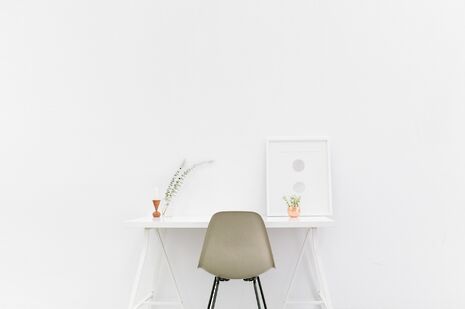Confessions of a self-professed minimalist
Minimalism isn’t the way to happiness it claims to be, says Eduardo Baptista

Among the life-improving tools the internet keeps offering us, minimalism has been gaining traction recently, promising to help us towards more fulfilling lives. Its proponents define it as a movement that seeks to pare down possessions to only the essentials, the central claim being that life is made more fulfilling following the removal of unnecessary possessions. Unfortunately, though, this claim does not stand the test of time, reason, and class.
Online minimalism stresses the present relevance of its ideals in a world of increasing financial insecurity and environmental sustainability. However, the notion of forgoing unnecessary possessions for the sake of a more fulfilled life is not a new one. Franciscan monks have been living under this ideal since the 13th century. Luxury was strongly condemned in Portugal during the Age of Discoveries and in France during the Enlightenment, while Henry David Thoreau’s Walden praises a lifestyle stripped of the unessential. Point is, the materialism present-day minimalists are crying out against is nothing new.
“Keeping every minuscule detail of the house rationally in order (even your sock draw) comes across as oppressive, obsessive, and time-consuming”
More importantly, I think there is a danger in the minimalist prescription. What does it mean to get rid of the unnecessary? Minimalist proponents like Joshua Becker make it explicit that minimalism does not mean frugality, it just means removing what we perceive to be in excess in our own lives. In theory, this seems to make sense. In practice, it underestimates the grey area lying between our perceived needs and desires.
Believers in minimalism claim that their lifestyle offers the key to leading a more fulfilling life, whereas accumulating objects offers only short-term comfort. But the underlying claim that we need fulfilment more than short-term comfort is a fundamentally middle-class approach on life. My home in Portugal is full of family heirlooms, most of them presents given to my grandparents who were illustrious doctors back in the day. Added to the fact that my basic needs – food, education, safety – have always been met, it is not particularly surprising or commendable that I have a de-cluttered room. Not to piss off any English students, but as refreshing as Thoreau’s self-sufficient life may be, even his transcendentalism would not have arisen without a comfortable upbringing and a Harvard education.
It’s easy to reflect upon ‘higher’ forms of satisfaction, such as fulfilment rather than comfort, when one has had all the means to engage in this kind of reflection. I like Nietzsche as much as the next cocky undergrad, but his ideal of a fulfilled life was matched by a despise for those incapable or unwilling to embrace the lifestyle he perceived as the best. This shows a lack of empathy, one that I think minimalism shares when it describes excess as an objectively bad thing.
Minimalism claims to be ‘counter-cultural’ but it’s just as much of a product of capitalist society as the consumerism it opposes. Underlying minimalism is a persistent need to order things, to categorise them, and to give them a ‘rational’ place within the household, a manifestation of the homo economicus that capitalism conditions humans to be. Just read a few pages of Spark Joy, best-selling book by de-cluttering guru Marie Kondo. To some people, Kondo’s prescriptions will be undoubtedly helpful. But for me, keeping every minuscule detail of the house rationally in order (even your sock draw) comes across as oppressive, obsessive, and time-consuming.
Essentially, present-day minimalism rejects any form of disorder or chaos in one’s life, which if you’re a controlling personality might be precisely what you need more of. Voltaire understood this 300 years ago when, in response to proponents of a minimalist lifestyle, he famously observed: “The superfluous? Something very necessary.”
Ultimately, I’m sympathetic to simple mindfulness and wary of material minimalism. Both value a calm state of mind, but the latter’s obsession with de-cluttering misses the point that I think the term ‘mindfulness’ captures quite well. As Kendrick Lamar once said, “the universe works mentally.” Ordering the mind is not dependent on a colour-coded wardrobe or a de-cluttered room
 Comment / The (Dys)functions of student politics at Cambridge19 January 2026
Comment / The (Dys)functions of student politics at Cambridge19 January 2026 Arts / Exploring Cambridge’s modernist architecture20 January 2026
Arts / Exploring Cambridge’s modernist architecture20 January 2026 Features / Exploring Cambridge’s past, present, and future18 January 2026
Features / Exploring Cambridge’s past, present, and future18 January 2026 Theatre / The ETG’s Comedy of Errors is flawless21 January 2026
Theatre / The ETG’s Comedy of Errors is flawless21 January 2026 News / Local business in trademark battle with Uni over use of ‘Cambridge’17 January 2026
News / Local business in trademark battle with Uni over use of ‘Cambridge’17 January 2026







